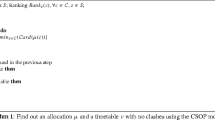Abstract
A constraint satisfiability problem consists of a set of variables, their associated domains (i.e., the set of values the variable can take) and a set of constraints on these variables. A solution to the CSP is an instantiation (or labeling) of all the variables which does not violate any of the constraints. Since constraint satisfiability problems are, in general, NP-complete, it is of interest to compare the effectiveness and efficiency of heuristic algorithms as applied, in particular, to our application. Our research effort attempts to determine which algorithms perform best in solving the student scheduling problem (SSP) and under what conditions. We also investigate the probabilistic techniques of Nudel for finding a near-optimal instantiation order for search algorithms, and develop our own modifications which can yield a significant improvement in efficiency for the SSP. Experimental results have been collected and are reported here. Our system was developed for and used at Bar-Ilan University during the registration period, being available for students to construct their timetables.
Similar content being viewed by others
References
J.R. Bitner and E.M. Reingold, Backtrack programming techniques, Comm. ACM 18 (1975) 651–655.
M. Bruynooge, Solving combinatorial search problems by intelligent backtracking, Infor. Process. Lett. 12 (1981).
R. Feldman and M.C. Golumbic, Optimization algorithms for scheduling via constraint satisfiability, IBM Israel Technical Report (Jan. 1989), submitted for publication.
E.C. Freuder, Synthesizing constraint expressions, Comm. ACM 21 (1978) 958–965.
M.C. Golumbic, Knowledge-based techniques in an academic environment,Proc. Int. Conf. on Courseware and Design and Evaluation, Symp. on Artificial Intelligence and Education, Ramat Gan, Israel (April 1986) pp. 355–362.
M.C. Golumbic, M. Markovich, S. Tsur and U.J. Schild, A knowledge-based expert system for student advising, IEEE Trans. Education E-29 (1986) 120–124.
M.C. Golumbic, M. Markovich and M. Tiomkin, A knowledge representation language for university requirements, Decision Support Systems 6 (1990).
R.M. Haralick and G.L. Elliot, Increasing tree search efficiency for constraint satisfaction problems, Artificial Intelligence 14 (1980) 263–313.
A.K. Mackworth, Consistency in networks of relations, Artificial Intelligence 8 (1977) 99–118.
U. Montanari, Networks of constraints: Fundamental properties and applications to picture processing, Information Science 7 (1974) 95–132.
S. Nishihara and K. Ikeda, A solution algorithm for the consistent labeling problem using the structure of constraints,Proc. 8th IEEE Int. Conf. on Pattern Recognition, Paris (1986) pp. 198–200.
S. Nishihara, Y. Matsuo and K. Ikeda, Optimization and performance evaluation of inexact consistent labeling problem using merge method, J. Jpn. Soc. Artificial Intelligence (1988) 196–205.
B. Nudel, Consistent-labeling problems and their algorithms: expected-complexities and theory-based heuristics, Artificial Intelligence 21 (1983) 135–178.
P.W. Purdom, Search rearrangement backtracking and polynomial average time, Artificial Intelligence 21 (1983) 117–133.
Author information
Authors and Affiliations
Rights and permissions
About this article
Cite this article
Feldman, R., Golumbic, M.C. Interactive scheduling as a constraint satisfiability problem. Ann Math Artif Intell 1, 49–73 (1990). https://doi.org/10.1007/BF01531070
Published:
Issue Date:
DOI: https://doi.org/10.1007/BF01531070




